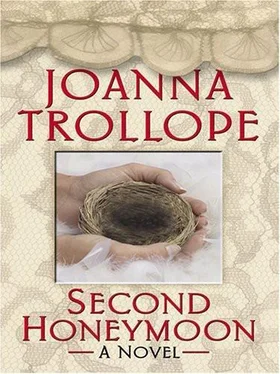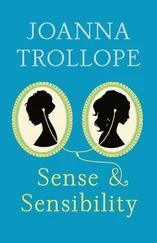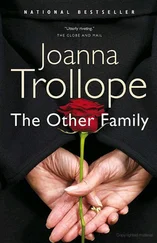Ruth had emailed Laura photographs of the loft on Bankside. Laura had been most approving, especially of the glass brick walls and double-height ceilings.
‘Go for it!’ she’d written.
Ruth had waited three days while she adjusted her need to confide against her loyalty to Matthew, and then she’d written, ‘I really want to. But there’s Matt’.
‘Doesn’t he like it?’
Another two days elapsed.
‘Yes,’ Ruth wrote reluctantly, ‘I think he does. But he’s worried about the money’.
Laura was marrying a lawyer who earned more than she did. Ruth sometimes thought it made her a little callous.
‘You mean he can’t afford it?’
‘Yes’.
‘Can you?’ ‘Yes,’ Ruth wrote.
‘Well?’
Ruth looked up from the screen. With no one in the office, she could hear the faint purring hum of the airconditioning system and, beyond the immediate silence of the office, the bigger hum of Liverpool Street outside. If the truth were told, Matthew had not actually said he could not afford to share equally in the loft on Bankside: he had, instead, made it very plain that he would -could? – not talk about it. He had been very busy in their present flat, fixing all kinds of things that Ruth regarded as the future tenants’ responsibility, but he had eluded any attempt at the kind of conversation Ruth was trying to have. She looked back at the screen.
‘The thing is,’ she wrote, ‘that we have never had an I-have-this and you-have-that conversation. I suppose neither of us wanted to spell out the difference. And the difference hasn’t been a factor, really, up to now. We’ve managed rather well’. She paused. Laura was bound to challenge that. ‘Don’t ask why we didn’t sort it at the beginning. You know what beginnings are like. You don’t care who earns what as long as you can be together and, by the time you start caring, it’s too late, the patterns of behaviour are in place’. She stopped and then she typed, ‘I love Matt’.
She lifted her hands off the keyboard and put them in her lap. Laura would tell her that everybody loved Matt, that Matt was the kind of thoughtful, decent, straightforward man who it would be perverse not to love. What Laura would also imply, from the current safety of her shiny new engaged situation, was that love might be about more than simply lovableness, it might include more stimulating elements like shared ambition and respect for professional achievement. She might also say – and she would be right – that Ruth and Matthew should have worked out this inequity early on in their relationship, that no amount of rapturous hand-holding on Devon beaches should have blinded Ruth to the fact that they had driven there in Ruth’s car, Matthew not possessing one, and were staying in the kind of hotel he quite candidly would not have considered.
It wasn’t, Ruth reflected, that he didn’t pay his way because he did, with sometimes almost painful eagerness, but she couldn’t help noticing that a tension about money had grown in him in the last year and, while she was genuinely sympathetic to that, she also felt that his concerns couldn’t take precedence over her ambitions, that what held him back shouldn’t hold her back too. If you made too many personal sacrifices, she and Laura had often agreed during late-night talking sessions with bottles of wine and Diana Krall on the stereo, you only ended up resenting the person you’d made the sacrifices for. Those old words, like ‘duty’ and ‘honour’, belonged to the history books, to an ancient imperial vocabulary that didn’t belong in anyone’s hearts or minds any more. You couldn’t, as a woman, make yourself into someone lesser in order to accommodate a man’s weaknesses. You couldn’t agree not to want, not to strive for, a very desirable flat on Bankside because the man you were sharing your life with quite simply couldn’t afford to match your input. She picked up a ballpoint pen.
‘Does that mean,’ she wrote across her jotting pad, ‘that I don’t love him enough?’
She tore the page off the pad and screwed it into a ball.
‘Or,’ she wrote, ‘are my values so skewed that at this moment I almost want a flat more than a man? And why do I want this particular flat so much? What is it about this one?’
She looked across her desk. There was a photograph of Matthew there, in a black bamboo frame, taken on holiday in the Maldives, a holiday he had suggested and had then – she could see it – had anxieties about paying for. He looked quite without anxiety in the photograph. He was wearing a white T-shirt and a wide smile and his hair was ruffled against a sky as blue as delphiniums.
Ruth ripped the second sheet off the jotting pad and tore it across. She glanced at her email to Laura. What possibilities it opened up for Laura to implore her – or instruct her – not to let herself down. She ran the cursor up the screen to cancel the message.
‘Do you,’ her computer asked politely, ‘wish to save the changes to this message?’
‘No,’ Ruth clicked. She looked at Matthew, laughing on his tropical beach. ‘Sorry,’ she said.
She could see, from the pavement below their building, that Matthew was home before her. She could also see, from the way the light fell, which lamps he had switched on and, from that, what sort of ambience there would be when she reached the second floor and even what kind of atmosphere. Sometimes, she wished she didn’t notice so much. Sometimes, she thought how peaceful it would be to be someone who didn’t observe so minutely and deduce so analytically. It meant, as Matthew had sometimes affectionately pointed out, that she lived her life twice, exhaustingly, once in preview, once in actuality.
‘What will you do,’ he’d said, holding her, his face against hers, ‘with the three spare days at the end of your life that you’ve lived already?’
She put her key into the main door. The communal hallway, solidly decorated in the style of a decade earlier, contained only a small reproduction side table on which all the mail for the building was piled. Matthew would already have sifted through the pile for their own mail, but something in Ruth needed to recheck it, every time she came in. Her father had been the same, she told herself consolingly, perpetually reassuring himself that everything was in order, even down to counting the change from his trouser pockets every evening before piling the coins, in precise order of size, on the chest of drawers in her parents’ bedroom. No wonder, she thought now, forcing herself past the side table without pausing, that she’d chosen someone like Matthew, someone who’d come from a family who regarded orderliness as a sadly psychotic condition. Two people like her in one relationship would simply have fossilised in their own methodicalness.
She ran up the two flights of stairs to their landing. The front door was slightly open and there was the sound of music, some of the dance-rock stuff Matthew liked.
She pushed the door wider open.
‘Hi there!’
Matthew appeared from the bedroom, feet bare on the wooden floor, but still in the shirt and trousers of his business suit. He bent to kiss her.
‘I like it,’ she said, ‘when you’re back first’.
He straightened.
He said, ‘I haven’t done anything, though, except take my jacket off—’ ‘I didn’t mean—’ ‘I know,’ he said.
She went past him into the sitting room. ‘Any mail?’ ‘Only dull things’.
She picked up the envelopes and glanced back at him. ‘Good day?’
‘So-so’.
She put the envelopes down.
She said, ‘I thought I’d go to the gym—’
Matthew leaned against the sitting-room door frame.
‘I thought you might’.
‘Want to come?’
Читать дальше












